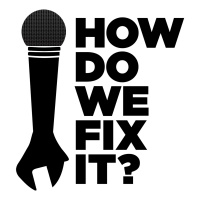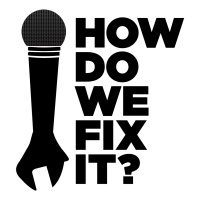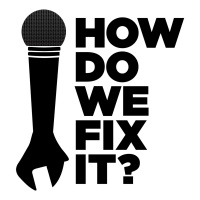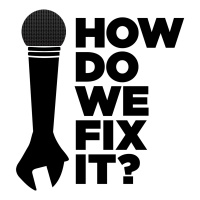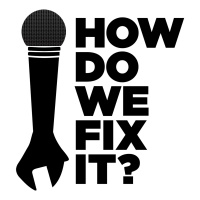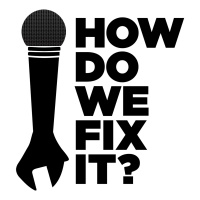How Do We Fix It?
- Autor: Vários
- Narrador: Vários
- Editor: Podcast
- Duración: 183:37:18
- Mas informaciones
Informações:
Sinopsis
From politics to the personal, we're about solutions. Our weekly podcast features two friends and longtime journalists. Join Richard Davies (ABC News) and Jim Meigs (Popular Mechanics) as they challenge authors, experts and provocateurs in a search for positive, practical ideas. Guests include Alan Dershowitz, a noted legal scholar and defender of civil liberties; Mike Rowe of "Dirty Jobs" and Lenore Skenazy, founder of "Free Range Kids." Topics include politics, parenting, personal finance, human behavior and much more. "How Do We Fix It?" - a repair manual for the real world. Produced by DaviesContent
Episodios
-
Why We Need Nuance: Meghan Daum
19/02/2021 Duración: 27minEven before the alarming and violent January 6 assault on the Capitol, American politics was in danger of spinning out of control— bumping up against the guardrails of our democratic institutions.On social media and in the civic square, many have separated into two camps that seem to hate the other side. We have become estranged from family and friends over politics.More than ever, we need nuance. In this episode, our guest is a liberal writer and feminist, Meghan Daum, who is increasingly critical of her own side: the left. Meghan wrote the book, “The Problem With Everything. My Journey Through The New Culture Wars.” She’s also the host of “The Unspeakable”, a podcast that celebrates disagreement and encourages guests to speak uncomfortable truths. “We are not allowing ourselves to sort through our confusions. You have to be on one side or the other,” says Meghan. “If you’re not conflicted, you are either lying to yourself, or you’re not very smart.”Recommendation: Jim reco
-
COVID Vaccine Hesitancy: Dr. Wrenetha Julion
12/02/2021 Duración: 28minMore than 10% of the U.S. population has received at least one dose of the COVID-19 vaccine, but injection rates are lower in black and brown communities, and many people express doubts about the shots made by Pfizer-BioNTech and Moderna. Vaccine hesitancy presents a barrier in the fight against coronavirus. A recent poll by Pew Research Center found that "Black Americans continue to stand out as less inclined to get vaccinated than other racial and ethnic groups: 42% would do so, compared with 63% of Hispanic and 61% of White adults."Our guest, Dr. Wrenetha Julion, professor and department chair at Rush University College of Nursing, discusses causes of vaccine hesitancy and how to encourage more people to take a high-effective vaccine against the virus. Vaccine hesitancy "is a significant problem," says Wrenetha. "It stems from a long history of mistrust and mistreatment of African-Americans and other groups in healthcare systems and research. Unfortunately, tho
-
Will Gen Z Save the GOP? Danielle Butcher and John Olds
05/02/2021 Duración: 27minAfter the recent storming of the US Capitol and the loss of both the White House and U.S. Senate, it's tempting to believe that civil war will break out among Republicans— a party deeply split between traditional conservatives and Trump-supporting populists.We decided to find out what two young Republicans say about the future of their party, and the need to confront those who believe in conspiracy theories and are nostalgic for a return to a mythical past. Our guests are Danielle Butcher and John Olds. Danielle, who was named to Forbes' 30 Under 30 List, co-founded the American Conservation Coalition, a non-profit group that backs free-market solutions for environmental problems. John Olds, Executive Director of Gen Z GOP, is a Republican activist and senior at George Washington University.Both Butcher and Olds are outspoken critics of Donald Trump. They believe that Republicans must develop constructive policies on climate change, racial inequities and student debt. Both support ma
-
The Loneliness Pandemic. Noreena Hertz
29/01/2021 Duración: 26minEven before coronavirus led to social distancing, widespread working from home, and lockdown restrictions, loneliness was becoming a defining condition of the twenty-first century. Today, this pandemic of pain and isolation is far worse. One of many recent polls found that more than three in five Americans say they are lonely, with more and more people reporting feeling like they are left out, poorly understood, and lacking companionship. Other surveys overseas have similar findings.Our guest, the British economist, Noreena Hertz, is the author of "The Lonely Century: How to Restore Human Connection in a World Pulling Apart." Her new book, published February 2, is a personal and deeply-researched investigation into the roots of the loneliness epidemic, how the pandemic and the 2020 election exacerbated the problem, and what we can do to come together. "Loneliness levels have significantly and not surprisingly increased during the pandemic, particularly among the young, women, and people of low incom
-
Free Speech in an Era of Conflict: Nadine Strossen
22/01/2021 Duración: 32minWe are in a stunning moment for our country. A hoard of rioters invaded our nation’s seat of government to try to overturn an election. Many of them appear to have been motivated by false and inflammatory statements by President Trump, and under the sway of wild online conspiracy theories. In response, our leading tech platforms have tried to silence Trump and shut down many of the channels where his most extreme supporters communicate. Is this the correct approach? Should Congress and the Biden Administration impose new regulations on big tech companies? How should free speech be protected?We discuss these questions and more with Nadine Strossen, who has written, taught, and advocated extensively in areas of constitutional law and civil liberties. From 1991 to 2008, she was President of the ACLU— the nation's largest and oldest civil liberties organization."The First Amendment is only a constraint on the government's censorial power," Nadine tells How Do We Fix It? "Facebook and Twitter are themselves p
-
Why Many Latinos Vote Republican: Geraldo Cadava
15/01/2021 Duración: 27minJust before the 2020 election, pundits predicted that Latino Americans would overwhelmingly vote for Joe Biden. And it’s true—Latino voters do tilt Democratic. But Donald Trump won a greater share of Latino votes in some states and large cities than he did in 2016. Because of decades of investment and political courtship, as well as a nuanced and varied cultural identity, the Republican party has had a much longer and stronger bond with Hispanics than many political commentators realize. In this episode, we speak with historian and Latino and Latina studies professor Geraldo Cadava about the findings of his recent book, "The Hispanic Republican".In the wake of the recent assault on the U.S. Capitol by Trump supporters, we also look at the hazards of putting large groups of voters in a box or describing their political behavior in simple terms. See acast.com/privacy for privacy and opt-out information.
-
Chaos at the Capitol: What Next? Lee Drutman
08/01/2021 Duración: 25minThe storming of the U.S. Capitol building by an angry mob of Trump supporters was a dark day in American history and a shock to people around the world. Images of looting and anarchy in the proud place where Congress has met for over 200 years, provoked profound despair and led many to question the stability of American democracy. The insurrection brought shame to President Trump, who incited a crowd to march on the legislative branch of government.In this special episode recorded the day after the chaos at The Capitol, we speak with political scientist Lee Drutman of New America, about the political causes of this violent outburst, and what reforms are needed to heal our democracy. "This has been a tremendous wake-up call for a lot of people," Lee told us. "We are really in a fight for the continuation of American democracy."Lee is the author of the book, "Breaking the Two-Party Doom Loop: The Case for Multiparty Democracy in America", and co-host of the podcast, "Politics in Question".
-
2020 Year-End Show: What We Learned About COVID
24/12/2020 Duración: 27minAt the start of 2020, the world first became aware of COVID-19. This show looks at what we have learned about the global pandemic since then. In early February, Richard spoke face-to-face with epidemiologist Kylie Carlville of the Doherty Institute for Infection and Immunity, during a visit to Melbourne, Australia. This recording was made just as scientists were beginning to understand the nature of the outbreak and before COVID-19 was declared a pandemic.In the spring, we interviewed Samson Ellis of Bloomberg News about Taiwan's remarkable success in fighting the spread of the virus. In late December, the number of deaths in Taiwan from COVID was 7, with only 766 recorded cases. Total US cases were more than 18 million.In June, oncologist, bioethicist, and healthcare expert, Dr. Ezekiel Emanuel, explained the global lessons to be learned from the crisis. He wrote the recently published book, “Which Country Has the World’s Best Healthcare?”This episode also includes practical lessons about public healthc
-
Net-Zero America by 2050: Jesse Jenkins and Eric Larson
18/12/2020 Duración: 31minIn his ambitious climate plan, President-elect Biden promises that by 2050 the United States will reach net-zero carbon emissions.A groundbreaking new study from energy experts at Princeton University outlines five different pathways for how to reach net-zero emissions of greenhouse gases, using existing technology, and at costs aligned with historical average spending on energy. The research is the first to quantify and map in specific detail the infrastructure that would be needed to achieve this goal.Our guests are Jesse Jenkins and Eric Larson, two principal investigators on the study. Jesse is an engineering professor, and Eric is a senior research engineer. Both work at Princeton's Andlinger Center for Energy and the Environment and have conducted extensive research on ways to produce clean energy."We wanted to paint several different pictures that are quite different from each other to illustrate there are many different ways to get to net-zero," Eric tells us. The study makes it clear that while reach
-
Mothers, Families and COVID - Erica Komisar
11/12/2020 Duración: 27minDespite the tragedy, suffering and economic losses of COVID, there are silver linings for many families in the current crisis. Recent lockdowns have a bright side for teens. A new survey says they're spending more time with their parents, getting extra sleep, and suffering from lower levels of clinical depression.Our guest, New York psychoanalyst, parent coach, and author Erica Komisar, wrote in The Wall Street Journal "it has taken a pandemic to prove that it's possible to integrate work into our personal lives, as many millions of parents are now working from home. "Everyone wins— maternity-leave advocates who have been fighting for this arrangement for years, employers, mothers and children most of all." In lockdowns, Erica tells us, "children are getting a great deal more of their parents' time and attention and energy than they have previously.' In this episode, we also discuss why the findings of her book, "Being There: Why Prioritizing Motherhood in the First Three Years Matters" challenge bo
-
Breakthroughs in Science & Space: Neil deGrasse Tyson
04/12/2020 Duración: 23minWe live in a remarkable time for science. Vaccines to fight COVID-19 have been developed with surprising speed and are reported to be more than 90% effective against the virus. Dramatic progress has also been made in the quest to overhaul and improve America's space program. Recent innovations and reusable rockets have dramatically cut the cost of space launches. Vaccine research and space innovation are examples of public-private partnerships between government and businesses. Neil deGrasse Tyson, America’s most prominent spokesman for science and the Director of New York City’s Hayden Planetarium, talks about the benefits to us all of having a cosmic perspective, the case for human space flight, and lessons learned from his best-selling book, "Astrophysics for People in a Hurry." We also discuss "We're Living in a New Space Age," in the new issue of Commentary Magazine, written by our co-host, Jim Meigs. A public-private partnership, with Elon Musk of Space
-
The Case for AllSides: John Gable, Samantha Shireman
20/11/2020 Duración: 29minMore than ever, we need to fight fake news and misinformation by getting out of our filter bubbles. A bitterly contested election at a time of political paralysis and partisan bickering makes the case for change even more urgent.In this episode, we look at the groundbreaking work of AllSides.com, which shines a light on media bias by offering readers a selection of daily news stories from publications that tilt left, right or center.Our guests are AllSides founder and CEO John Gable, and the site’s director of product, Samantha Shireman.AllSides is an increasingly popular media destination with many millions of page views that aims to strengthen democracy with balanced news and diverse perspectives. Today's recommendation: Richard is reading "Apeirogon", a novel by the Irish writer, Colum McCann. See acast.com/privacy for privacy and opt-out information.
-
Problem Solvers in Congress: Abigail Spanberger (D) Brian Fitzpatrick (R)
13/11/2020 Duración: 30minIn the days since the 2020 election, political distrust and anxiety have only deepened. But divided government and very narrow majorities for both parties in Congress might present an opportunity for bipartisan solutions on several major issues. President-elect Biden has talked about his vision of an America that is "unified, strengthened, and healed." In this episode we discuss the case for compromise with two Members of Congress, one Republican and one Democrat. Both are members of Problem Solvers Caucus, a group of 25 members of each party who work together across rigid partisan divides. Democrat Abigail Spanberger, the U.S. Representative for Virginia's 7th Congressional District, won a second term in an area narrowly won by Donald Trump. Two days after the election she spoke out against messaging used by progressives, telling fellow House Democrats that talk of socialism and defunding the police nearly led to her defeat. Brian Fitzpatrick&
-
Our Election 2020 Lessons. Jim and Richard
06/11/2020 Duración: 24minDays after the historic 2020 election, final results are still coming in. But some lessons of the vote are becoming clear. On this episode, our hosts, Richard and Jim, discuss the five lessons they learned. 1. The system is working - so far. Despite the slow pace of counting, election day was met with massive enthusiasm by voters from all sides.2. Reform opinion polls - They were wrong again. Polls in Florida, Texas and Wisconsin are among the worst examples. Many polls under-counted Trump voters.3. Stop Generalizing! The Latino vote is much more complex than many assume. Faulty generalizations are also made about the influence of money in campaigns. 4. The Woke Counter Rebellion Has Begun.Despite Trump’s unpopularity with moderates, he did better than expected. Many voters may be put off by violence in Portland, progressive calls to defund the police, and higher taxes. 5. Character Counts. Joe Biden made this an election about character a
-
Record High Voter Turnout? Seth Flaxman
30/10/2020 Duración: 27minOne of the biggest surprises of the 2020 election may turn out to be turnout. Traditionally, a smaller percentage of American voters participate in elections than in many other democracies around the world. But this year, early voting hit a record high, with tens of millions of mail-in ballots, and very long lines at many polling places.In this episode, we look at a highly innovative, successful initiative to use the internet to boost the number of voters in elections. "Our mission" says the non-profit group Democracy Works "is to make voting a simple, seamless experience for all Americans, so that no one misses an election." Democracy Works CEO and co-founder. Seth Flaxman is our guest. "At the end of the day, we think every American is going to want a sort of service, like a concierge, helping them to vote in the election," he says. "Even people who say they never miss elections sign up to get the reminders."This episode is funded with a grant from Solutions Journalism Network as part of "Ren
-
Covid Pandemic: America's Wake Up Call. Adrian Wooldridge
23/10/2020 Duración: 30minIf the Covid pandemic has taught us anything, it is that the government's response to a global health emergency can mean the difference between living and dying.America's woeful performance in recent months has exposed how far we have fallen behind public health systems in much of Asia. While China, Japan, South Korea, Taiwan and Singapore combined have recorded fewer than 1,000 cases per day since September, the U.S. is reporting over 60,000 daily cases.Our guest is Adrian Wooldridge of The Economist, and co-author of "The Wake Up Call: Why the Pandemic Has Exposed the Weakness of the West and How to Fix It.""We need to have a much more efficient government that is collectively valued by society," says Adrian. He argues that it's time to make government great again. In this episode, we discuss steps to improve government's use of technology and delivery of services while protecting individual liberty.Recommendation: Jim is listening to the podcast "50 Years of Music With 50 Year-Old White Guys"note
-
Four Threats: American Democracy in Crisis: Suzanne Mettler
16/10/2020 Duración: 30minMore than half of American voters expect to see a rise in violence after election day, according to a recent poll. Only 49% said Americans will largely accept the results.These findings and others suggest that American democracy is facing intense stress. President Trump has repeatedly refused to say whether he would accept the official results. "Trump and Biden supporters have deep disagreements over several aspects of the election and voting process – including whether it will be clear which candidate won even after all the votes are counted," says Pew Research Center.This episode examines how our current problems compare to past outbreaks of political turmoil. Professor Suzanne Mettler, co-author of the new book, "Four Threats: The Recurring Crises of American Democracy" is our guest.The four threats are: polarization, racism and nativism, economic inequality, and excessive presidential power. "Today, for the first time ever, all four of these threats t
-
Why Voting Isn't Enough. CivicLex: Richard Young, Megan Gulla
09/10/2020 Duración: 30minHow do you get supporters of Donald Trump and Joe Biden in the same room at the same time working together on something political? It sounds almost impossible, but even at a time of hyper-partisan division, progress and trust can be achieved on a local level. In this episode, we look at the groundbreaking work of CivicLex, a non-profit civic education and solutions journalism group based in Lexington, a Kentucky city of nearly 400,000 people. Civic Lex has three main goals: Improve access to information, Change the processes that govern how the city interacts with residents, and Democratize political power. Our CivicLex guests are: Executive Director, Richard Young, who has worked on civic engagement and community development projects for almost a decade, and Director of Programs, Megan Gulla, who has worked and volunteered in a variety of fields, including creative, local journalism. CivicLex has won funding from The National Endowment for the Arts, Knight Foundation, Facebook J
-
Advice to my Younger Self: Bruce Van Dusen
02/10/2020 Duración: 27minHow does your career stay on track at a time of very high unemployment, great technological change and enormous uncertainty? We explore these questions and much more with one of the advertising industry's most successful commercial directors. When he was 23, Bruce Van Dusen was desperate for a job. For the next 40 years, he thought that every commercial that he made would be his last. With a mix of audacity, determination, and hard work, plus a dash of deep personal insecurity, Bruce developed a remarkable knack for crafting stories that could be told in 30 seconds. His wise and highly entertaining new book is "60 Stories About 30 Seconds: How I Got Away With Being a Pretty Big Commercial Director Without Losing My Soul (Or Maybe Just Part of It)."We discuss some lessons Bruce learned along the way-- lessons that he wished he had known when he started out in his crazy, fast-changing industry. Such as: Go to a meeting any time anywhere; Treat all famous people like they're not; Nothing
-
Loving Yourself and Humanity: Chloé Valdary
25/09/2020 Duración: 25minAnger, fear and loathing cut across our deeply divided, hyper-partisan political divide. From The White House and the streets of cities, to furious posts on social media, many of us objectify others. Those belong to the wrong tribe are often the objects of personal scorn.In a recent Twitter post, our guest, Chloé Valdary, says: "if you do not possess the power to love, and especially love your enemies, then you don't really have the power."In this episode, Chloé talks about her antiracism program, Theory of Enchantment, which uses pop culture as an educational tool, teaching social and emotional learning in schools, and diversity and inclusion in companies and government agencies. The three key principles involve:1. We are human beings, not political abstractions.2. Use criticism to uplift, not tear down.3. Lead with love and compassion.Recommendation: Jim is reading the new book, "Utopia Avenue" by British novelist, David Mitchell. See acast.com/privacy for












